Rimple Sanchla's Blog, page 21
April 4, 2025
Little gifts that drift our way
“Clouds come floating into my life, no longer to carry rain or usher storm, but to add color to my sunset sky
by Rabindranath Tagore
It’s such a peaceful, dreamy thought, isn’t it? Let me paint it for you in simple, heartfelt words.
Picture yourself standing outside as the day winds down, the sky turning soft shades of orange and pink.
The sun is dipping low, and suddenly, clouds drift in—light and fluffy, not heavy or dark like they sometimes are. In the past, you might have seen clouds and thought of rain soaking your clothes or thunder rumbling through the air. But not this time. Tagore imagines these clouds as gentle visitors, floating into his life with a new purpose. They’re not here to bring trouble or chaos—they have let go of their storms. Instead, they are like artists, brushing strokes of color across the sunset, making it even more beautiful.
This line feels like a sigh of relief, a moment of calm after a long journey. It’s as if Tagore is saying that sometimes, things we once feared—like clouds that used to mean rain—can change. They can come into our lives and surprise us with something lovely instead. Maybe he is talking about the way life works, too. Hard times, like storms, don’t last forever. And when they pass, what’s left can brighten our days in ways we didn’t expect—like clouds turning a plain sunset into a masterpiece of gold, purple, and red.
It’s a reminder to look up and see the beauty in what’s around us, even in things that once seemed heavy or uncertain. These clouds aren’t weighing him down anymore; they are lifting his spirit, adding a splash of wonder to his evening. Tagore’s words feel like an invitation—to let go of old worries and welcome the little gifts that drift our way, coloring our lives with quiet joy. Isn’t that a lovely way to see the world?
Whole and Free – the way a flower lives
I read a beautiful quote of Rabindranath Tagore and couldn’t stop appreciating the beauty of this short and simple line that is so meaningful.
Line is:
By plucking her petals, you do not gather the beauty of the flower.
It’s a short line, but it’s so full of meaning, like a tiny seed that holds the promise of a big, blooming tree. Let me unfold it for you in a simple and beautiful way.
Imagine a flower—maybe a soft rose or a bright sunflower—swaying gently in the breeze. It’s alive, glowing with color, and its fragrance floats around, making everything feel a little more magical. Now, picture someone coming along and pulling off its petals, one by one, thinking, “If I take these pieces, I’ll have the flower’s beauty all to myself.” But what happens? The flower wilts, its charm fades, and those petals, once so vibrant, turn dry and lifeless in their hands. Tagore is saying that beauty isn’t something you can grab or break apart to keep. The real magic of the flower isn’t in its pieces—it’s in the way it lives, whole and free.
This line is like a quiet whisper about life itself. Think of the things we love—maybe a sunny day, a friend’s laughter, or a song that lifts your heart. You can’t bottle up the sunshine or pull apart a laugh to hold onto it. If you try to clutch too tightly, you lose what made it special in the first place. Tagore’s words remind us to step back and let beauty just be—to enjoy it without trying to own it. It’s like watching a butterfly dance in the air; you don’t need to catch it to feel its wonder.
So, in this simple yet deep thought, Tagore invites us to see the world with gentler eyes. The flower’s beauty isn’t in the petals you can pluck—it’s in the life that shines through them, in the way they come together to make something whole. And maybe, just maybe, he’s telling us to treat the people and moments we cherish the same way: with care, with awe, and with a little space to let them bloom.
April 3, 2025
Day 9 of Navratri and Maa Siddhidatri
The ninth night of Navratri is dedicated to Goddess Siddhidatri. She is a generous goddess who blesses her devotees with all siddhis—special powers or gifts. She brings fulfillment and happiness to their lives.
The Golden Light of FulfillmentSiddhidatri shines with a radiant golden light that glows over the Crown chakra, at the top of the head. This light fills the soul with joy and peace, helping devotees feel complete and satisfied.
Unlocking Spiritual GiftsGoddess Siddhidatri gives her worshippers the ability to achieve great things through her siddhis. These gifts guide them toward a life of purpose, connecting them to divine energy and inner strength.
Service to God and LiberationHer energy inspires devotees to serve God and seek freedom from the cycle of life and death. Siddhidatri helps the soul break free from struggles, leading it toward liberation and eternal peace.
Siddhidatri as Parvati: The Pauranic History ConnectionSiddhidatri is a form of Goddess Parvati from ancient Pauranic History stories. She is known as the giver of perfection, offering her devotees the power to rise above challenges and find spiritual success.
A Simple Golden Light MeditationTo feel close to Siddhidatri, picture a warm golden light shining above your head. Let it flow into you, bringing a sense of calm, strength, and freedom. This easy practice connects you to her blessings.
Tying It All TogetherOn the ninth night, Mata Siddhidatri wraps up Navratri with her gifts of fulfillment and liberation. Her golden light over the Crown chakra brings spiritual power, peace, and a deep connection to the divine.
Day 8 of Navratri and Maa Mahagauri
The eighth night of Navratri celebrates Goddess Mahagauri. She is a kind and pure goddess who removes all sins from her devotees. She cleanses their hearts and minds, making them feel pure and light in every way.
The Power of Purity and Inner PeaceMahagauri brings a special energy that feels like a bright, cleansing light. This energy heals the soul by wiping away wrong thoughts and actions. It helps devotees feel calm, peaceful, and ready to do good.
Guiding Thoughts to GoodnessGoddess Mahagauri directs the minds of her worshippers toward virtue, or the right way of living. She destroys Asat, which means falsehood or negativity, and replaces it with truth and positivity.
Energy Flowing Through the Whole BodyOn this day, Mahagauri’s energy spreads across the entire body. It’s a powerful, balanced force that makes devotees feel strong and whole. This energy lifts their spirit and brings a sense of harmony.
Mahagauri as Parvati: The Pauranic History ConnectionMahagauri is a form of Goddess Parvati from ancient tales. She is known for her beauty and purity, and she uses her power to purify her devotees, helping them leave behind their mistakes.
A Simple Meditation for PurificationTo connect with Mahagauri, imagine a white light filling your body from head to toe. This easy practice can help you feel her cleansing energy, letting go of negativity and welcoming peace.
Tying It All TogetherOn the eighth night, Goddess Mahagauri offers purification and balance. She clears away sins and false thoughts, filling devotees with a pure, positive energy that flows through their whole being.
Day 7 of Navratri and Maa Kaalratri
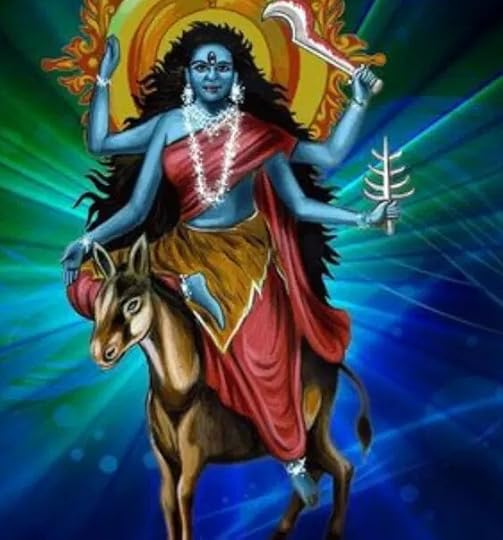 The Seventh Night of Navratri and Goddess Kaalratri
The Seventh Night of Navratri and Goddess KaalratriThe Seventh night of Navratri is dedicated to Goddess Kaalratri. She is a powerful form of the goddess who removes fear and ignorance from her devotees. She blesses them with strength and courage, helping them face life without fear.
The Violet Light and Emotional HealingGoddess Kaalratri is linked to a violet light with a purple-blackish glow. This light brings peace and clarity to the mind, healing deep fears and confusion. It helps devotees feel strong and fearless in their hearts.
The Sahasrara (Crown) Chakra in DepthThis day connects to the Crown chakra, located at the top of the head. It involves the brain, nervous system, and the pineal gland. When this chakra is active, it opens the door to higher understanding and spiritual growth.
Spiritual Discipline and Navratri’s Seventh StepThe seventh day of Navratri is a time for spiritual focus. Goddess Kaalratri guides devotees to connect their soul (Atma) with the divine (Parmatma). It’s a step toward deeper awareness and inner strength.
Violet Light Visualization in Modern MeditationIn meditation, imagining a violet light at the top of your head can calm your mind. This practice, inspired by Kaalratri, boosts spiritual awareness and helps heal the body and mind, especially the brain and nervous system.
Kaalratri as Parvati: The Pauranic History ConnectionKaalratri is another form of Goddess Parvati. In stories, she takes this fierce form to destroy evil and protect her devotees. Her energy clears darkness, bringing light and wisdom to those who worship her.
Tying It All TogetherOn the seventh night, Goddess Kaalratri unites strength, fearlessness, and spiritual growth. Through her violet light and the Crown chakra, she helps devotees overcome fears, heal their minds, and connect with the divine.
April 1, 2025
Day 6 of Navratri and Maa Kaatyayani
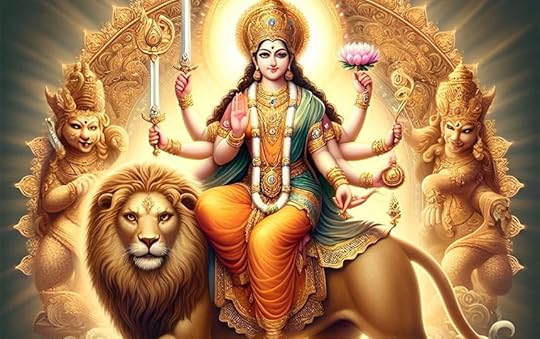 The Sixth Night of Navratri and Goddess Kaatyayani
The Sixth Night of Navratri and Goddess KaatyayaniThe sixth night of Navratri celebrates Goddess Kaatyayani, a deity who grants boons and fulfills the wishes of her devotees. She glows with a yellow light that represents self-worth, intellect, confidence, and strong moral values, blessing those who worship her.
The Yellow Light and Emotional HealingKaatyayani’s yellow light brings emotional healing by boosting self-confidence and a sense of value. This energy helps devotees feel good about themselves, strengthening their mind and spirit while encouraging them to live with honesty and pride.
The Manipur (Solar Plexus) Chakra in DepthGoddess Kaatyayani resides in the Manipur, or solar plexus chakra, located in the upper abdomen. This chakra connects to organs like the liver, spleen, stomach, large intestine, gallbladder, and middle back, along with the pancreas gland. It’s all about how you see yourself and how others see you. When this energy is active, it keeps these organs and systems healthy and supports a strong sense of identity.
Spiritual Discipline and Navratri’s Sixth StepOn the sixth day of Navratri, worshiping Goddess Kaatyayani teaches us discipline and self-respect. This step in the festival helps us build confidence and stay true to our principles, guided by her powerful blessings.
Yellow Light Visualization in Modern MeditationIn meditation, picturing a bright yellow light can enhance self-worth and intellect. Inspired by Kaatyayani, this practice helps clear doubts, heal the body, and strengthen the mind, making us feel more sure of ourselves.
Kaatyayani as Parvati: The Pauranic History ConnectionGoddess Kaatyayani is a fierce form of Parvati, born to the sage Katyayana (hence her name). Known for her courage and determination, she fought evil forces to protect the world. She blesses her devotees with the power to overcome challenges and fulfill their deepest desires.
Tying It All TogetherGoddess Kaatyayani’s yellow light on the sixth night of Navratri combines self-worth, intellect, and confidence. Through her energy in the solar plexus chakra, she helps us feel strong and respected, healing our body and mind while granting our wishes.
Day 5 of Navratri and Skand Mata
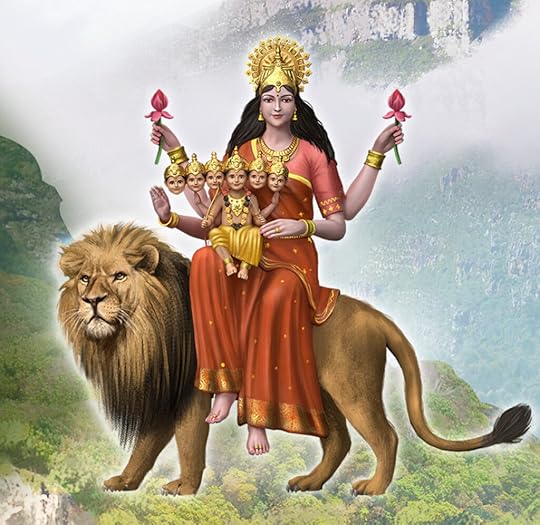
The fifth night of Navratri is dedicated to Goddess Skandmata, who takes the energies from the other goddesses and turns them into wealth and strength for her devotees. She shines with an indigo light mixed with a silver hue, spreading her divine power and grace.
The Indigo Light and Emotional HealingSkandmata’s indigo light, with its silver glow, brings emotional healing by encouraging trust in oneself. This energy helps devotees feel calm and confident, guiding them to follow their inner voice and find peace within.
The Agya (Brow) Chakra in DepthGoddess Skandmata resides in the Agya, or brow chakra, located between the eyebrows. This chakra is connected to the eyes, lower head, nose, and ears, as well as the pituitary gland. It’s all about self-responsibility and intuition—knowing your soul’s path and trusting your own wisdom. When this energy is strong, it keeps these organs and systems healthy and balanced.
Spiritual Discipline and Navratri’s Fifth StepOn the fifth day of Navratri, worshiping Goddess Skandmata teaches us discipline and self-awareness. This step in the festival helps us take responsibility for our own growth, listening to our intuition and staying true to ourselves with her blessings.
Indigo Light Visualization in Modern MeditationIn meditation, imagining an indigo light with a silver touch can boost intuition and self-trust. Inspired by Skandmata, this practice helps clear the mind, heal the body, and connect us to our inner strength.
Skandmata as Parvati: The Pauranic History ConnectionGoddess Skandmata is a form of Parvati, known as the mother of Lord Skanda (Kartikeya), the warrior god. Her name means “mother of Skanda,” and she represents nurturing strength and protection. She guides her devotees with love, turning their efforts into blessings of power and prosperity.
Tying It All TogetherGoddess Skandmata’s indigo and silver light on the fifth night of Navratri blends strength, wealth, and self-responsibility. Through her energy in the brow chakra, she helps us trust ourselves and grow stronger, healing our body and spirit along the way.
March 31, 2025
Vincent Murphy deliberately replaced Hitler’s Hakenkruez with Swastika.
 The Hindu Swastika: A Sacred Symbol of Well-Being
The Hindu Swastika: A Sacred Symbol of Well-BeingThe Hindu swastika is an ancient symbol that has been part of Indian culture and Hindu traditions for thousands of years. It is deeply respected and holds a special place in religious and spiritual practices. The word “swastika” comes from Sanskrit, the language of traditional Hindu texts. In Sanskrit, “swastika” is made of two words: “su” (meaning good or well) and “asti” (meaning to be), so it literally means “well-being.” For Hindus, the swastika stands for prosperity, good fortune, and auspiciousness.
Shape and Design: The Hindu swastika is a simple cross with four arms of equal length, each arm bending at a right angle. It can face either right or left, depending on the tradition, and both directions are considered sacred.
Meaning: It represents positive energy, the cycle of life, and the movement of the sun. It’s a symbol of harmony and balance in the universe.
Use: You’ll see it drawn on doors, temples, or during ceremonies like weddings and festivals to bring good luck and blessings.
Science Behind It: In Hindu belief, the four arms can symbolize the four Vedas (ancient scriptures), the four stages of life, or the four directions, showing a connection to nature and existence.
The Nazi Swastika: A Twisted Symbol of HateThe Nazi symbol does not mean swastika originally. In his book Mein Kampf Hitler clearly mentions that his Nazi Party symbol is called the Hakenkreuz (hooked cross) in German, was adopted by Adolf Hitler and the Nazi Party in the 20th century. Unlike the Hindu swastika, this is a cross, though now it is called Swastika. This version is a distorted and rotated form that became a symbol of racism, violence, and destruction during World War II. Hitler took an ancient symbol and changed its meaning completely for his own dark purposes.
Shape and Design: The Nazi hooked cross (misunderstood as Swastika) is tilted at a 45-degree angle, making it look like it’s spinning or slanted. The arms are hooked in a way that gives it a sharp, aggressive appearance, usually facing right. It’s most often seen in black inside a white circle with a red background.
Meaning: For the Nazis, it stood for their ideas of racial superiority and power. It has no connection to the original positive meaning of the Hindu swastika.
Use: It was used on Nazi flags, uniforms, and propaganda to spread fear and control, especially during the Holocaust.
Why Hitler Chose the Hakenkreuz
Hitler was fascinated by ancient symbols and myths, and he chose the “Hakenkreuz,” or “hooked cross,” as the Nazi emblem. This hooked cross is a symbol in Christianity where Jesus Christ is hooked on Cross, call it crucifixion. Some also say he encountered this symbol through German nationalist groups who tied it to their distorted notion of an “Aryan” past (a fabricated historical concept). Inspired by its bold, ancient form, Hitler adapted the hooked cross—tilting it and giving it a sharp, aggressive look—to match his ideology of hate and power. Unlike the Hindu swastika, which he didn’t directly reference, his version was meant to evoke a Germanic heritage, twisted in both design and purpose to serve the Nazi agenda.
The Hindu swastika and the Nazi hooked cross may look somewhat similar at a glance, but they are worlds apart in meaning, history, and design. Here’s how they differ:
Age: The Hindu swastika is thousands of years old, dating back to ancient India. The Nazi hooked cross misunderstood as Swastika was created in the 1920s by Hitler’s party.
Purpose: The Hindu version is about peace, luck, and well-being. The Nazi hooked cross misunderstood as Swastika is about war, hate, and oppression.
Appearance: The Hindu swastika is upright and simple, while the Nazi hooked cross misunderstood as Swastika is rotated 45 degrees and often bold and harsh-looking.
Context: Hindus use it in prayers and celebrations. Nazis used it as a political tool for terror.
How Hitler Hijacked the SymbolHitler didn’t invent the swastika, but he stole it from ancient cultures and gave it a new, ugly meaning. For him it was never Swastika but always a hooked cross.
Before the Nazis, the swastika was used in many places—like India, Europe, and even Native American art—as a sign of good things. Hitler saw it in Austrian and German groups that were obsessed with a fake “Aryan” history. He liked its bold shape and thought it could represent strength for his Nazi Party. By rotating it and putting it on a red flag, he made it his own, stripping away its sacred roots.
The Hindu swastika remains a symbol of light and hope for millions.
Hitler’s Use of “Hakenkreuz” and the Translation TwistThe Nazi hooked cross misunderstood as Swastika is a reminder of a dark time—proof that the same shape can mean very different things depending on who uses it and why.
In Mein Kampf, Adolf Hitler called the Nazi symbol “Hakenkreuz,” meaning “hooked cross” in German, rather than “swastika.” The term “hooked cross” could hint at Christian imagery, like the cross, but Hitler used it to craft a distinct German symbol for his ideology, separate from its ancient origins. When James Vincent Murphy, a Catholic priest, translated Mein Kampf into English in the 1930s, he swapped “Hakenkreuz” for “swastika.” This raises suspicion: Did Murphy intentionally link it to the well-known swastika of Hindu tradition to distance it from Christian symbolism? By doing so, he may have deliberately shifted focus away from any “hooked cross” connection to Christianity, muddling Hitler’s term with the ancient, sacred Hindu symbol and creating confusion that persists today.
CONCLUSIONHitler’s Nazi Party Symbol is a HOOKED CROSS…. NOT SWATIKA… It was a deliberate attempt of a Catholic Priest James Vincent Murphy he swapped “Hakenkreuz” for “swastika” to taint the image of Hinduism sacred ancient symbol and protect the image of Christianity symbol of hooked cross where Jesus Christ was Crucified!!!!

Worshipping Young Girls in Navratri
यत्र नार्यस्तु पूज्यन्ते रमन्ते तत्र देवताः।
यत्रैतास्तु न पूज्यन्ते सर्वास्तत्राफला क्रिया:॥
Where women are honoured, divinity blossoms there. And where they are Dishonoured, all actions remain unfruitful.
This is the Sanskrit Verse showing how women are directly connected to the Divine. This is Hinduism.
In the Hindu festival of Navratri, which lasts nine sacred days, a special ritual called Kanya Pujan or Kumari Pujan takes center stage. This involves worshipping young, unmarried girls—known as Kumaris—for all nine days or on key days like Ashtami (eighth) or Navami (ninth), depending on tradition. These girls are seen as living forms of Goddess Durga, embodying her pure, unmanifested energy. By honoring them, devotees awaken this divine power, drawing positive vibrations from the universe that bring blessings like strength, peace, and prosperity. Families invite these girls into their homes, wash their feet, offer them food, new clothes, and gifts, and bow to them to seek their blessings—an act that shows deep reverence for the feminine divine.
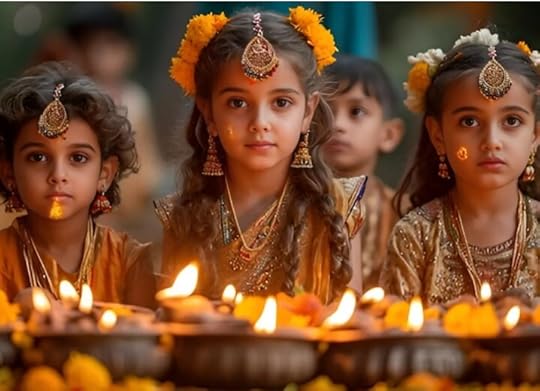
The Hindu scripture Rudrayamala Tantra explains that girls of different ages represent unique aspects of the Goddess, each offering distinct boons. For example:
A one-year-old girl is Sandhya, symbolizing calm and balance.A two-year-old is Saraswati, the goddess of knowledge.A three-year-old is Tridhamurthy, reflecting the triple divine form.A four-year-old is Kalika, a fierce protector.A five-year-old is Subhga, bringing good luck.At six, she is Uma, a form of Parvati.At seven, she is Malini, full of grace.At eight, she is Kubja, teaching humility.At nine, she is Kaalsandharbha, tied to strength over time.At ten, she is Aparajita, the invincible one.At eleven, she is Rudrani, a powerful Shakti.A twelve-year-old is Bharavi, vibrant with energy, and at thirteen, she is Mahalaxmi, goddess of wealth.At fourteen, fifteen, and sixteen, she is Peethnayika (leader), Chetraja (ruler), and Ambika (divine mother), respectively.Each age carries a special energy, and worshiping a Kumari of that age blesses devotees with specific gifts, like wisdom, courage, or abundance, based on their devotion.
Significance of Kanya Pujan in HinduismKanya Pujan is a cornerstone of Navratri because it celebrates the divine feminine, or Shakti, in its purest form. In Hinduism, young girls are not just symbols—they are treated as real embodiments of the Goddess. This ritual shows that every girl carries sacred energy, a power that is honored before she even steps into adult roles like wife or mother. By bowing to her, devotees—men and women alike—express gratitude and humility, recognizing that Shakti is the source of all life and strength. This practice connects the individual to the cosmic energy of the universe, bringing spiritual growth and physical well-being.
The significance goes deeper: it’s a celebration of innocence, potential, and purity. Unlike many traditions that value women only for their roles in family or society, Kanya Pujan honors girls for simply being who they are—divine in their essence. This act strengthens the bond between humanity and the Goddess, reminding everyone that femininity is sacred and powerful at every stage of life.
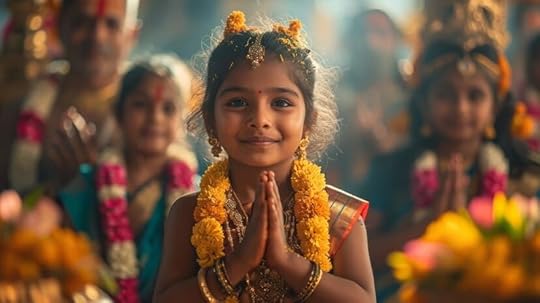 How Hinduism Stands Unique with Kanya Pujan
How Hinduism Stands Unique with Kanya PujanHinduism’s Kanya Pujan is unmatched in its reverence for young girls and women, setting it apart from every other faith or culture. No other religion has a ritual where young girls are worshiped as living goddesses, given such a central and active role in a major festival. This isn’t just respect—it’s devotion, a belief that the divine resides in every girl and woman, no matter her age.
In Hinduism, this reverence isn’t limited to Navratri. The faith worships goddesses like Durga, Lakshmi, and Saraswati as supreme powers, not just as companions to male gods. But Kanya Pujan takes it further by bringing that worship into the real world, making it tangible. Young girls—ordinary daughters and sisters—are lifted to the status of deities, their feet washed and their blessings sought by entire families. This isn’t a symbolic gesture; it’s a living practice that shows women and girls as sacred in their own right.
Other faiths may honor women in stories or teachings, but none match this direct, ritualistic elevation of young girls to divine status. Hinduism doesn’t just say women are important—it shows it through actions like Kanya Pujan, where even a one-year-old girl is seen as a goddess worthy of worship. This tradition reflects a core Hindu belief: Shakti, the feminine energy, is the driving force of creation, protection, and transformation. By celebrating girls and women in this way, Hinduism stands alone in its deep, practical respect for the feminine, making Kanya Pujan a truly unique and powerful expression of that value.
Below are some more Sanskrit verses on Women.
अतुलं तत्र तत्तेजः सर्वदेवशरीरजम्।
एकस्थं तदभून्नारी व्याप्तलोकत्रयं त्विषा॥
The incomparable radiance that was born from all gods and pervaded the 3 worlds, came to one place and took the form of a woman.
नारी अस्य समाजस्य कुशलवास्तुकारा अस्ति
Woman is the perfect architect of the society.
Significance of Three-Claps during Kanya Pujan and even Garbaनारी राष्ट्रस्य अक्शि अस्ति
Woman is the eye of the nation
In Hinduism, during the vibrant Garba dance or the sacred Kanya Pujan ritual of Navratri, the rhythm of three claps holds deep spiritual meaning. These claps are not just a sound—they are believed to awaken divine energy through the frequencies of desire, action, and knowledge. Each clap connects to the holy trinity of Brahma, Vishnu, and Mahesh (Shiva), the three supreme forces that create, sustain, and transform the universe. This practice also stirs the fire element, a symbol of power and purification in Hindu tradition. No other faith in the world ties such a simple act to the worship of the divine feminine, making it a unique part of Hinduism’s celebration of women and young girls.
The First Clap: Awakening Brahma’s Energy of DesireThe first clap calls forth the energy of Lord Brahma, the creator of the universe. This clap represents the spark of desire—the wishes and dreams that live in the heart of every individual. In the context of Kanya Pujan, it’s a moment to honor the pure intentions behind worshiping young girls as forms of the Goddess. Devotees believe that by clapping once, they awaken their inner longing for blessings like peace, strength, or prosperity, which the Kumaris, as embodiments of Shakti, can help fulfill. This energy of desire sets the stage for the divine connection between the worshiper and the feminine power they revere.
The Second Clap: Awakening Vishnu’s Energy of ActionThe second clap brings to life the energy of Lord Vishnu, the preserver who sustains all existence. This clap stands for action—the steps and efforts a person takes to turn their desires into reality. During Garba, the rhythmic clap matches the dance movements, symbolizing devotion in motion. In Kanya Pujan, it reflects the active respect shown to the young girls—washing their feet, offering them food, and bowing to them. Vishnu’s energy flows through these acts, showing that honoring the divine feminine isn’t just a thought but a living practice. It’s about putting faith into action, a value deeply cherished in Hinduism.
The Third Clap: Awakening Shiva’s Energy of Knowledge and BoonsThe third clap invokes the energy of Lord Shiva, the transformer and giver of wisdom. This clap signifies the results—the boons or blessings that come from devotion and effort. In Hindu belief, Shiva’s power brings knowledge, clarity, and fulfillment, completing the cycle started by desire and action. During Kanya Pujan, this clap is a moment of gratitude, as devotees receive the divine grace of the Kumaris, who bless them as living goddesses. The fire element tied to this clap burns away ignorance, leaving behind the light of understanding and the gifts of the Goddess, like courage, health, or abundance.
A Unique Hindu Celebration of the FeminineThe three claps weave together the energies of creation, preservation, and transformation, all centered around the worship of Shakti—the feminine divine. Whether in the joyous spins of Garba or the quiet reverence of Kanya Pujan, this ritual reflects Hinduism’s unmatched devotion to women and young girls. The claps awaken the fire within, purifying the mind and soul while honoring the sacred energy of the Goddess in every Kumari. No other religion ties such a profound spiritual act to the celebration of femininity, making this a uniquely Hindu tradition. Through these three simple claps, devotees connect to the cosmic forces of Brahma, Vishnu, and Shiva, all while bowing to the divine power of girls and women—a practice that stands alone in its beauty and depth.
Day 4 of Navratri and Mata Kushmanda
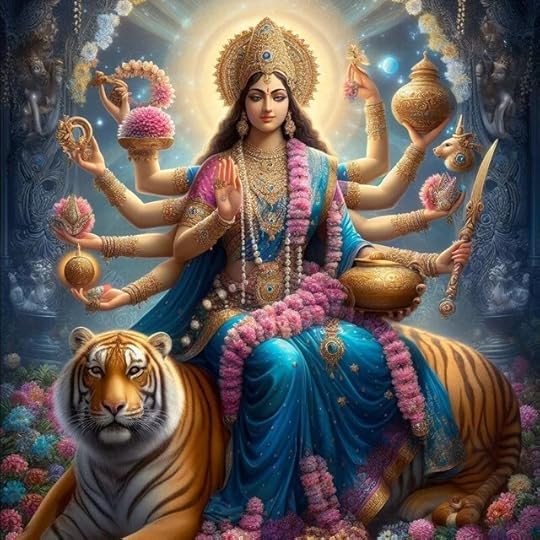 The Fourth Night of Navratri and Goddess Kushmanda
The Fourth Night of Navratri and Goddess KushmandaThe fourth night of Navratri celebrates Goddess Kushmanda, who removes sorrows of the mind and ego. She connects the big universe outside with the small universe inside us. Her energy shines as an orange light with a golden hue, inspiring creativity and respect for others’ work while clearing away false pride.
The Orange Light and Emotional HealingMata Kushmanda’s orange light, mixed with a golden glow, brings emotional healing by boosting creativity and self-worth. It helps us let go of ego and negative thoughts, filling us with peace and confidence.
The Swadhisthan (Sacral) Chakra in DepthGoddess Kushmanda’s power lives in the Swadhisthan, or sacral chakra, located in the lower abdomen. This chakra is tied to creativity and self-respect. It connects to organs like the uterus, large bowel, ovaries, testes, and sexual organs, as well as the reproductive system. When this energy is strong, it supports health and balance in these areas.
Spiritual Discipline and Navratri’s Fourth StepOn the fourth day of Navratri, worshiping Goddess Kushmanda teaches us discipline and inner harmony. This step in the festival encourages us to value ourselves and others, growing stronger in spirit and purpose.
Orange Light Visualization in Modern MeditationIn meditation, picturing an orange light with a golden touch can spark creativity and self-respect. Inspired by Kushmanda, this practice helps heal the mind and body, bringing a sense of balance and joy.
Kushmanda as Parvati: The Pauranic History ConnectionGoddess Kushmanda is a form of Parvati, known for creating the universe with her smile. Her name means “the one who creates the cosmic egg,” showing her power to bring life and energy. She guides her devotees to overcome ego and embrace humility.
Tying It All TogetherMata Kushmanda’s orange and golden light on the fourth night of Navratri blends creativity, healing, and self-respect. Through her energy in the sacral chakra, she helps us let go of sorrows and grow in harmony with the world around us.



